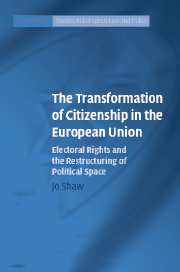 The Transformation of Citizenship in the European Union
The Transformation of Citizenship in the European Union Book contents
- Frontmatter
- Dedication
- Contents
- List of figures
- List of tables
- Preface and acknowledgments
- PART I Electoral rights in legal and political context
- PART II The past, present and future of EU electoral rights
- PART III The contestation of electoral rights in the Member States of the European Union
- 8 National politics of immigrant inclusion: the extension of electoral rights to resident non-nationals
- 9 Electoral exclusion, models of citizenship and the contestation of belonging
- 10 Out of Empire: electoral rights, enlargement and the wider Europe
- PART IV Conclusions
- Bibliography
- Index
10 - Out of Empire: electoral rights, enlargement and the wider Europe
from PART III - The contestation of electoral rights in the Member States of the European Union
Published online by Cambridge University Press: 05 June 2015
- Frontmatter
- Dedication
- Contents
- List of figures
- List of tables
- Preface and acknowledgments
- PART I Electoral rights in legal and political context
- PART II The past, present and future of EU electoral rights
- PART III The contestation of electoral rights in the Member States of the European Union
- 8 National politics of immigrant inclusion: the extension of electoral rights to resident non-nationals
- 9 Electoral exclusion, models of citizenship and the contestation of belonging
- 10 Out of Empire: electoral rights, enlargement and the wider Europe
- PART IV Conclusions
- Bibliography
- Index
Summary
Introduction
The examples given in the previous two chapters of both inclusion and exclusion have focused on the pre-2004 Member States of the EU. As was explained at the beginning of Chapter 8, there are good reasons for taking a closer look at cases of electoral inclusion and exclusion in the new post-2004 Member States, in particular those of Central and Eastern Europe which were previously part of the broad ‘Soviet bloc’ (or non-aligned in the case of the former Yugoslavia), because they raise on the whole a slightly different set of issues. That does not mean there is no overlap between what will be discussed in this chapter and the cases examined in Chapters 8 and 9. Spain, for instance, has undergone a relatively recent transition from autocracy to democracy, and (indeed, like the UK) still has a relatively unstable set of territorial governance arrangements; such factors all impact upon questions of citizenship and membership, as we have seen. Equally, Ireland's transition from a country of emigration to a country of immigration, which has occurred in concert with processes of economic and political modernisation, offers some parallels with processes of change occurring in Central and Eastern European states at the present time, not least because the choices of economic policy mix and tax policies made by the respective governments to encourage foreign investment bear considerable similarities. However, at this stage, with enlargement in 2004 a very recent memory, and with the changes triggered in 1989 still very much in mind, it is useful to examine some of the key contestations over the scope of electoral rights in the new Member States in a separate chapter, focusing in particular on the consequences of polity formation and re-formation.
This chapter will look at how the Baltic states (Estonia, Latvia and Lithuania) have addressed the issue of the political participation and integration of the large ethnic Russian minorities within their borders and how Slovenia has dealt with the issue of citizenship definition, given its history as a borderland state, situated at the cusp of many empires, states and blocs which have come and gone over the centuries.
- Type
- Chapter
- Information
- The Transformation of Citizenship in the European UnionElectoral Rights and the Restructuring of Political Space, pp. 320 - 348Publisher: Cambridge University PressPrint publication year: 2007


